Engineering managers play a crucial role in the tech industry, guiding teams to successfully deliver software products. They not only manage projects but also lead and inspire their teams, ensuring that all technical requirements are met efficiently.
The skills required for an engineering manager include a mix of technical expertise and soft skills such as leadership, project management, and communication. Understanding these skills is key to assessing potential candidates effectively.
Candidates can write these abilities in their resumes, but you can’t verify them without on-the-job Engineering Manager skill tests.
In this post, we will explore 8 essential Engineering Manager skills, 9 secondary skills and how to assess them so you can make informed hiring decisions.
Table of contents
8 fundamental Engineering Manager skills and traits
The best skills for Engineering Managers include Technical Expertise, Project Management, Problem Solving, Communication Skills, Risk Management, Resource Allocation, Quality Assurance and Strategic Planning.
Let’s dive into the details by examining the 8 essential skills of a Engineering Manager.
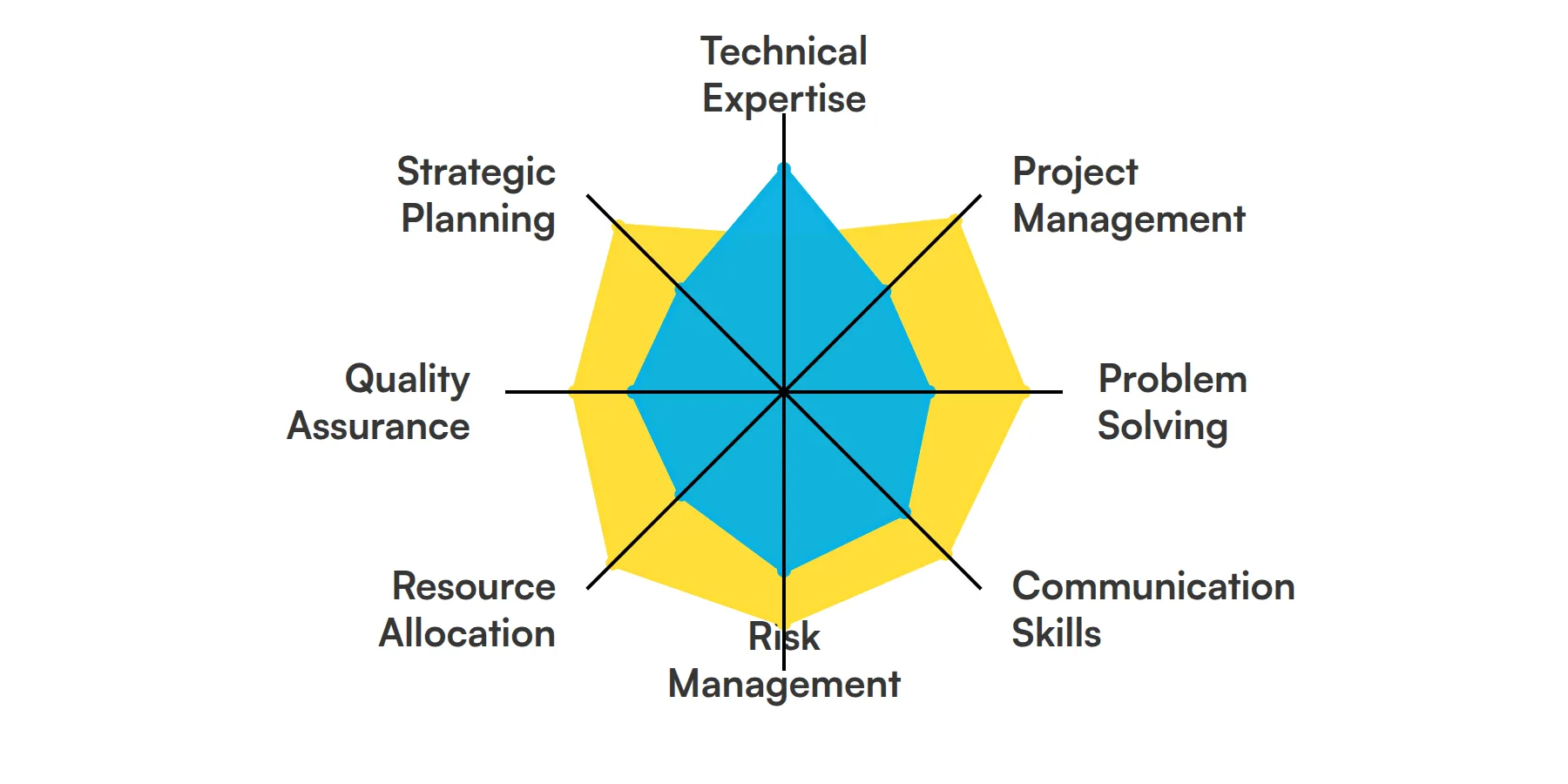
Technical Expertise
An engineering manager must have a strong technical background to understand the complexities of the projects their team is working on. This knowledge allows them to make informed decisions, guide their team effectively, and communicate technical concepts to non-technical stakeholders.
For more insights, check out our guide to writing a Technical Writer Job Description.
Project Management
Managing timelines, resources, and deliverables is a key responsibility for an engineering manager. They need to ensure that projects are completed on time and within budget, while also maintaining quality standards. This involves planning, scheduling, and coordinating tasks across teams.
Problem Solving
Engineering managers are often faced with complex challenges that require innovative solutions. They must be able to analyze problems, identify root causes, and develop strategies to overcome obstacles, ensuring that their team can continue to progress smoothly.
Check out our guide for a comprehensive list of interview questions.
Communication Skills
Clear and effective communication is crucial for an engineering manager. They need to convey ideas, expectations, and feedback to their team, as well as report progress and issues to upper management. Good communication helps in aligning the team with the company's goals.
Risk Management
Identifying potential risks and developing mitigation strategies is an important part of an engineering manager's role. They need to anticipate challenges that could impact project success and take proactive steps to minimize their effects.
Resource Allocation
An engineering manager must efficiently allocate resources, including personnel, tools, and budget, to ensure project success. This involves understanding the strengths and weaknesses of team members and assigning tasks accordingly.
Quality Assurance
Ensuring that the final product meets the required standards is a key responsibility for an engineering manager. They must implement quality control processes and encourage a culture of continuous improvement within their team.
For more insights, check out our guide to writing a Quality Assurance (QA) Engineer Job Description.
Strategic Planning
Engineering managers need to align their team's efforts with the broader goals of the organization. This involves setting long-term objectives, identifying opportunities for growth, and planning for future challenges.
9 secondary Engineering Manager skills and traits
The best skills for Engineering Managers include Budget Management, Mentoring, Conflict Resolution, Adaptability, Stakeholder Management, Data-Driven Decision Making, Time Management, Technical Writing and Networking.
Let’s dive into the details by examining the 9 secondary skills of a Engineering Manager.
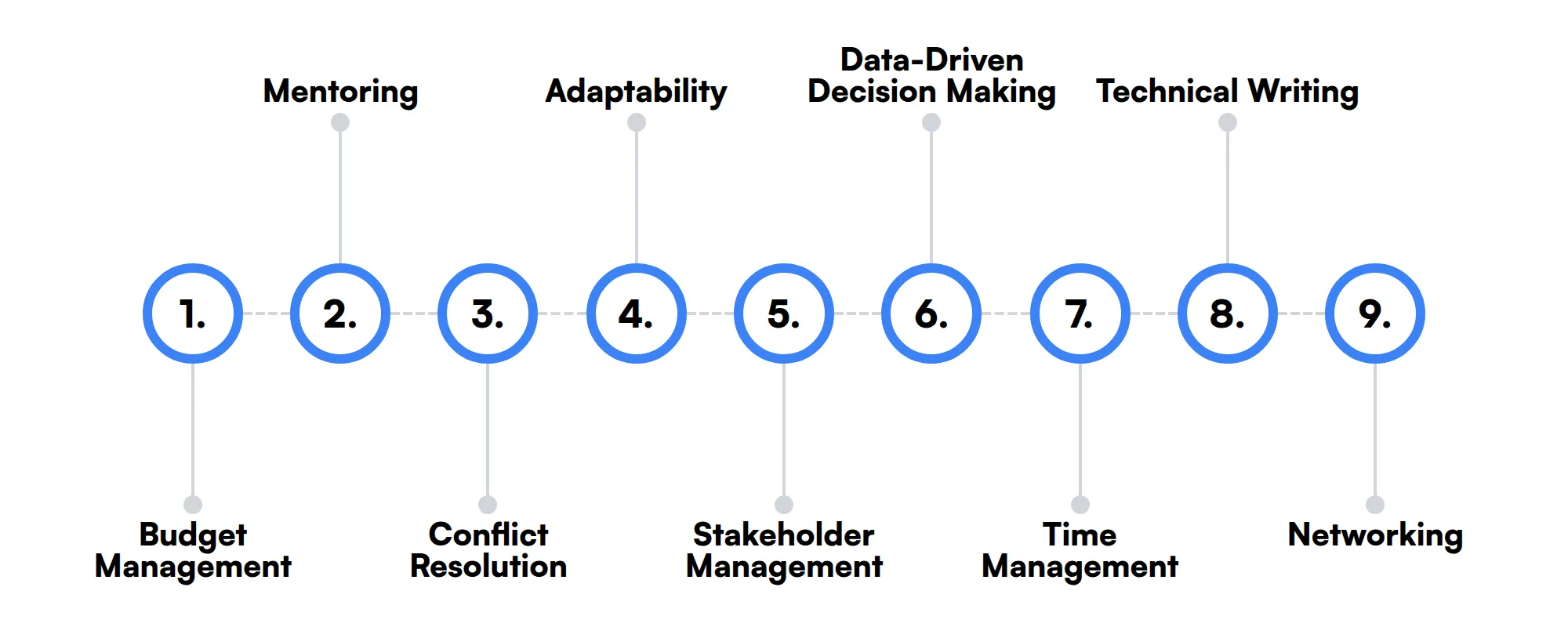
Budget Management
Managing the financial aspects of a project is important for an engineering manager. They need to ensure that the project stays within budget while still meeting quality and timeline requirements.
Mentoring
An engineering manager should guide and support the professional development of their team members. This involves providing feedback, sharing knowledge, and helping team members grow in their careers.
Conflict Resolution
Conflicts can arise in any team, and an engineering manager must be adept at resolving them. This involves mediating disputes, fostering a collaborative environment, and ensuring that team dynamics remain positive.
Adaptability
The ability to adapt to changing circumstances is important for an engineering manager. They must be flexible in their approach and open to new ideas and technologies that can benefit their team and projects.
Stakeholder Management
Engineering managers need to manage relationships with various stakeholders, including clients, vendors, and other departments. This involves understanding their needs and expectations and ensuring that they are met.
Data-Driven Decision Making
Using data to inform decisions is a valuable skill for an engineering manager. They should be able to analyze metrics and performance indicators to guide their team's efforts and improve project outcomes.
Time Management
An engineering manager must effectively manage their own time and that of their team. This involves prioritizing tasks, setting deadlines, and ensuring that work is completed efficiently.
Technical Writing
Documenting processes, creating reports, and writing technical specifications are part of an engineering manager's responsibilities. Clear and concise technical writing ensures that information is accessible and understandable.
Networking
Building a network of contacts within and outside the organization can be beneficial for an engineering manager. Networking can provide opportunities for collaboration, knowledge sharing, and career advancement.
How to assess Engineering Manager skills and traits
Assessing the skills and traits of an Engineering Manager is a nuanced process that involves more than just glancing at a resume. Engineering Managers play a critical role in guiding teams and projects to success, requiring a blend of technical and managerial expertise. Understanding how to evaluate these skills effectively is key to finding the right candidate for your organization.
While traditional interviews and references provide some insights, they often fall short in painting a complete picture of a candidate's capabilities in areas like Project Management, Risk Management, and Strategic Planning. This is where skills assessments come into play, offering a more objective and comprehensive method to evaluate potential hires.
Adaface assessments are designed to measure a range of competencies from Technical Expertise to Quality Assurance, ensuring that candidates not only have the right knowledge but also the ability to apply it in real-world scenarios. By integrating these assessments into your hiring process, you can achieve a 2x improvement in the quality of your hires and significantly cut down on screening time.
Let’s look at how to assess Engineering Manager skills with these 6 talent assessments.
Software Engineering Online Test
The Software Engineering Online Test evaluates candidates on their understanding of core computer science concepts such as data structures, algorithms, databases, programming paradigms, and design patterns. It also includes a coding question to assess problem-solving and hands-on programming ability.
This test covers a range of skills including Object-Oriented Programming, Database Design, Algorithms and Data Structures, and Testing and Quality Assurance. Candidates are challenged with scenario-based MCQs and a coding question to demonstrate their technical aptitude and problem-solving skills.
High-scoring candidates show proficiency in Web Development, Software Security, and Code Optimization, indicating a well-rounded understanding of software engineering principles.
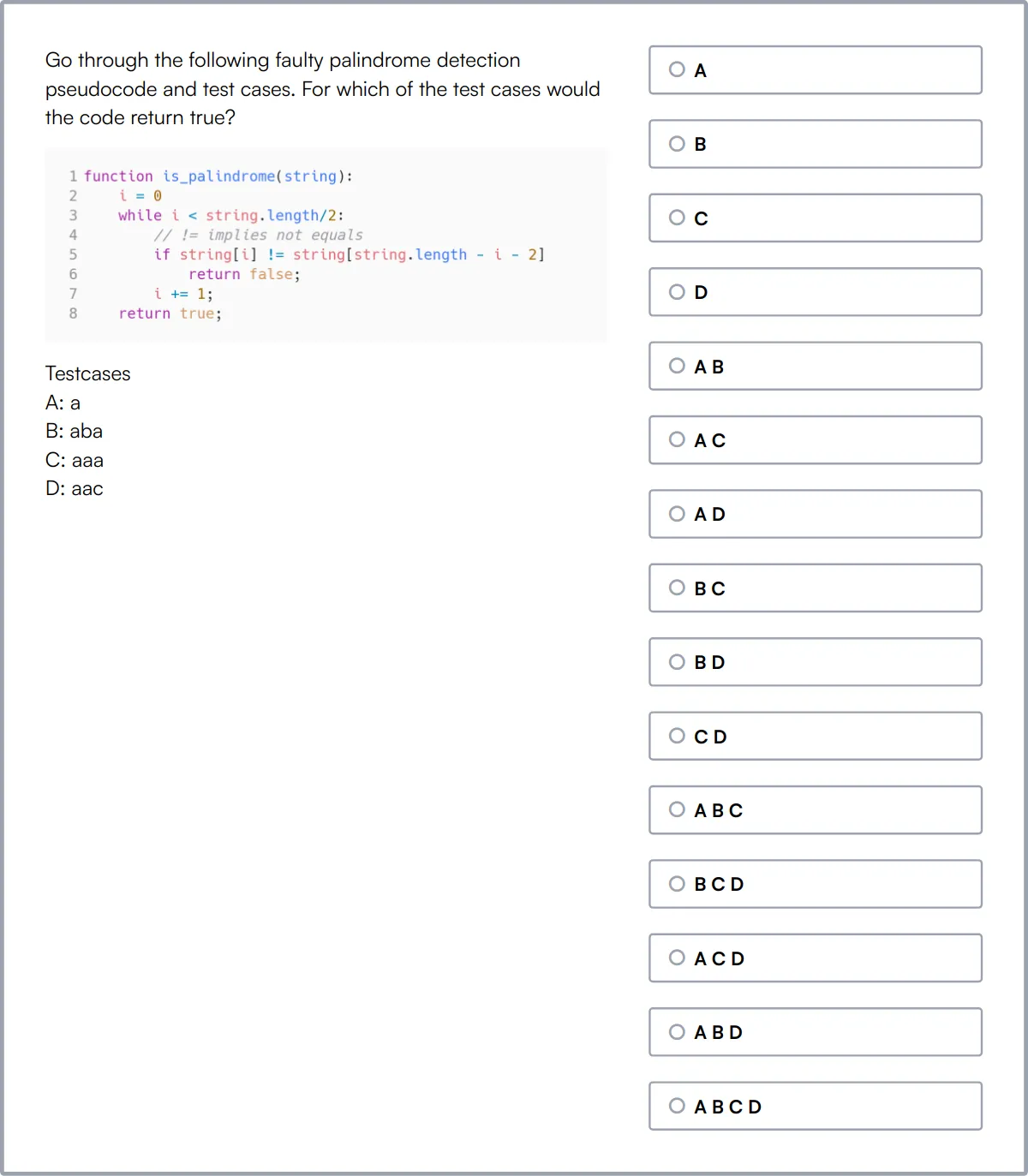
Project Management Test
The Project Management Test assesses a candidate's ability to plan projects from conception to implementation, map timelines, assess risks, allocate budgets, and manage stakeholders. It is designed to identify candidates who can take ownership of a project and work with a team to deliver it.
The test evaluates skills such as Cost and Budget Estimation, Stakeholder Management, and Risk Analysis. Candidates are tested on their understanding of both Agile and Traditional (Waterfall) Project Management methodologies, as well as their ability to resolve issues and handle changes.
Successful candidates demonstrate strong Situational Judgement and the ability to Prioritize Tasks in Real-Time, showcasing their capability to manage and control resources effectively.
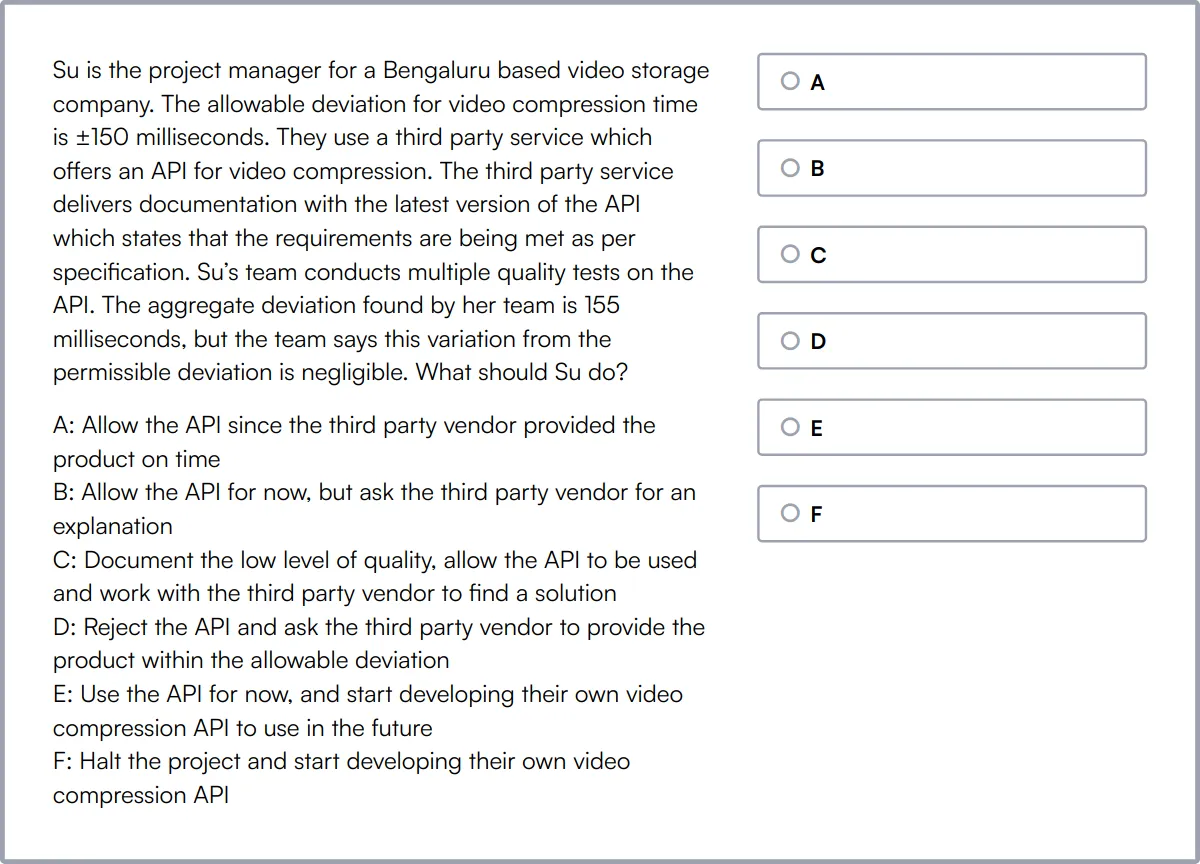
Problem Solving Test
The Problem Solving Test evaluates a candidate's ability to understand instructions, analyze data, and respond to complex problems or situations. It provides insights into their problem-solving skills, learning agility, and coachability.
This test covers skills such as Abstract Reasoning, Critical Thinking, Deductive Reasoning, and Inductive Reasoning. Candidates are challenged with questions that require them to interpret data and identify patterns.
High-scoring candidates demonstrate strong Spatial Reasoning and Pattern Matching abilities, indicating their aptitude for tackling complex problems and adapting to new challenges.
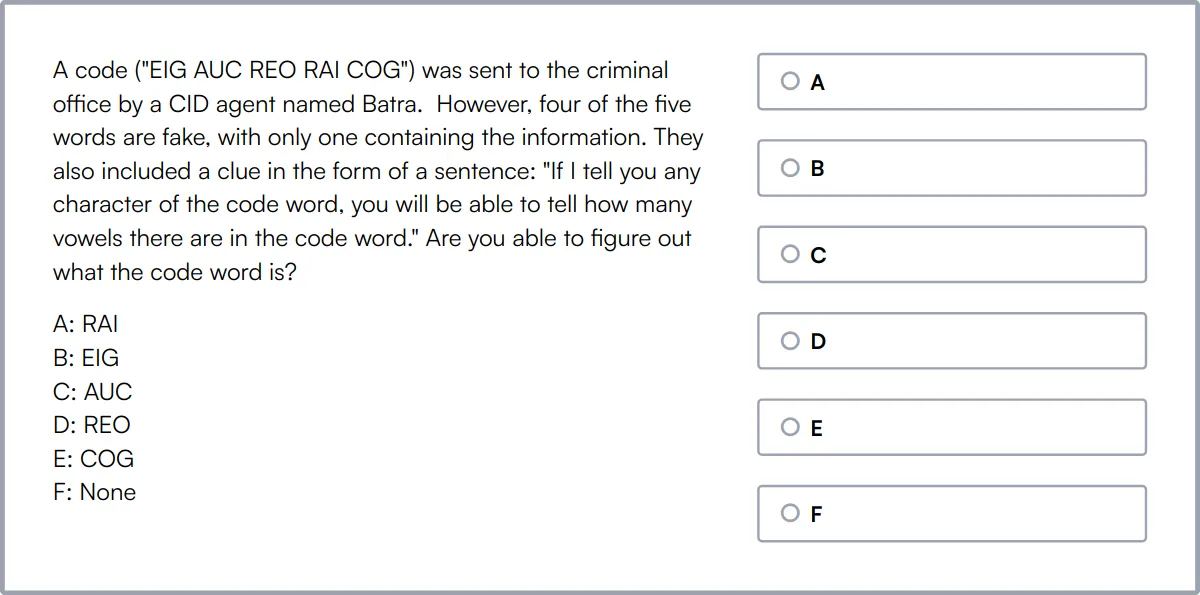
Communication Skills Test
The Communication Skills Test evaluates candidates' communication skills, including verbal and written communication, active listening, and interpersonal skills. It assesses their ability to effectively communicate with customers, colleagues, and stakeholders in various professional scenarios.
The test covers skills such as Situational Judgement, Attention to Detail, and Verbal Reasoning. Candidates are assessed on their ability to express themselves clearly and provide clarity to teammates.
Candidates who score well demonstrate strong Critical Thinking and the ability to summarize complex information, showcasing their proficiency in professional communication.
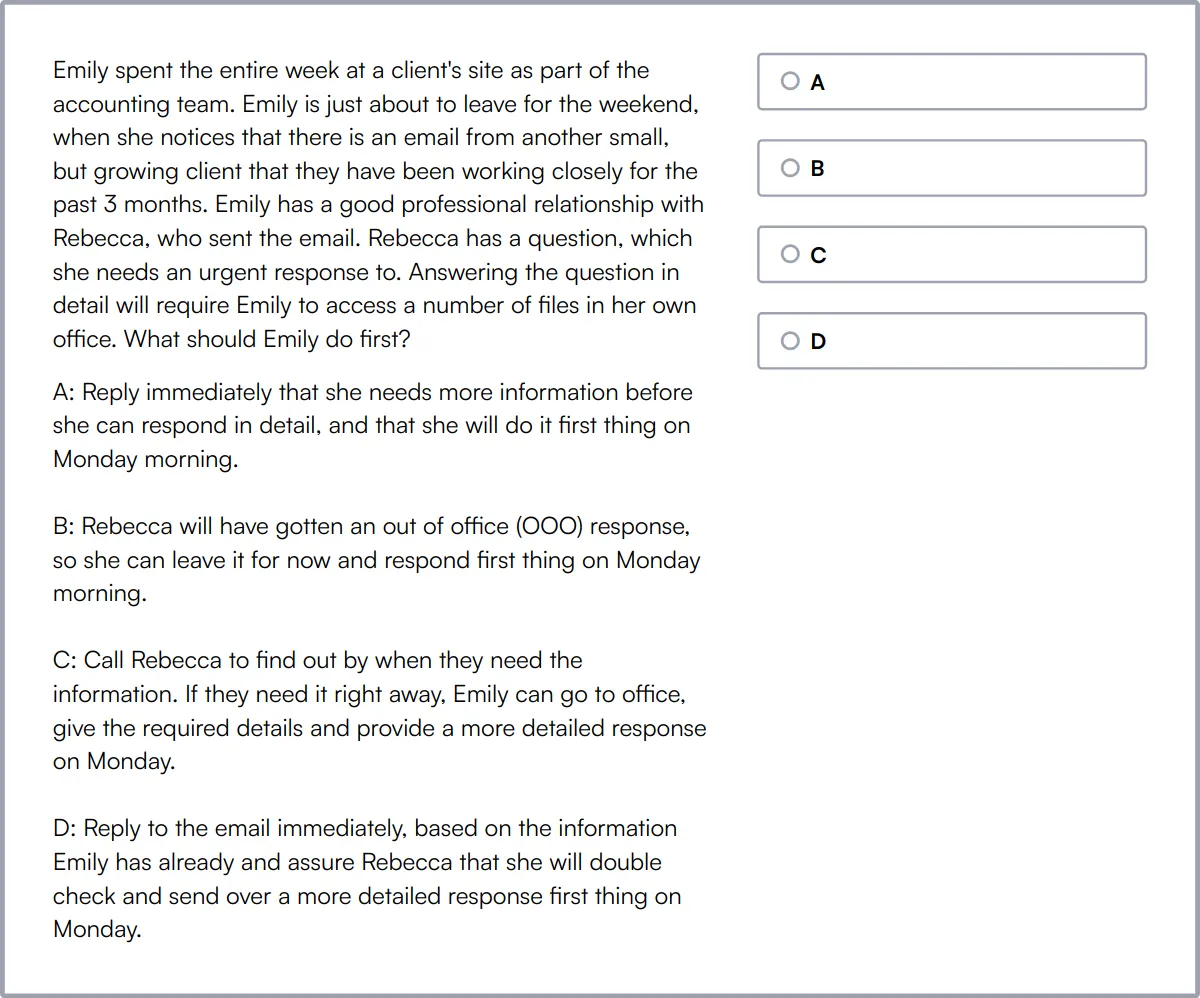
Scrum Master Test
The Scrum Master Test evaluates a candidate's knowledge and understanding of the Scrum framework, agile principles, and the role of a Scrum Master. It covers topics such as sprint planning, product backlog management, and daily stand-up meetings.
This test assesses skills in Scrum, Agile Framework, Sprint Planning, and Product Backlog Management. Candidates are tested on their understanding of Scrum Roles and Scrum Events.
High-scoring candidates demonstrate proficiency in conducting Iteration Reviews and Retrospectives, indicating their ability to facilitate continuous improvement within a team.
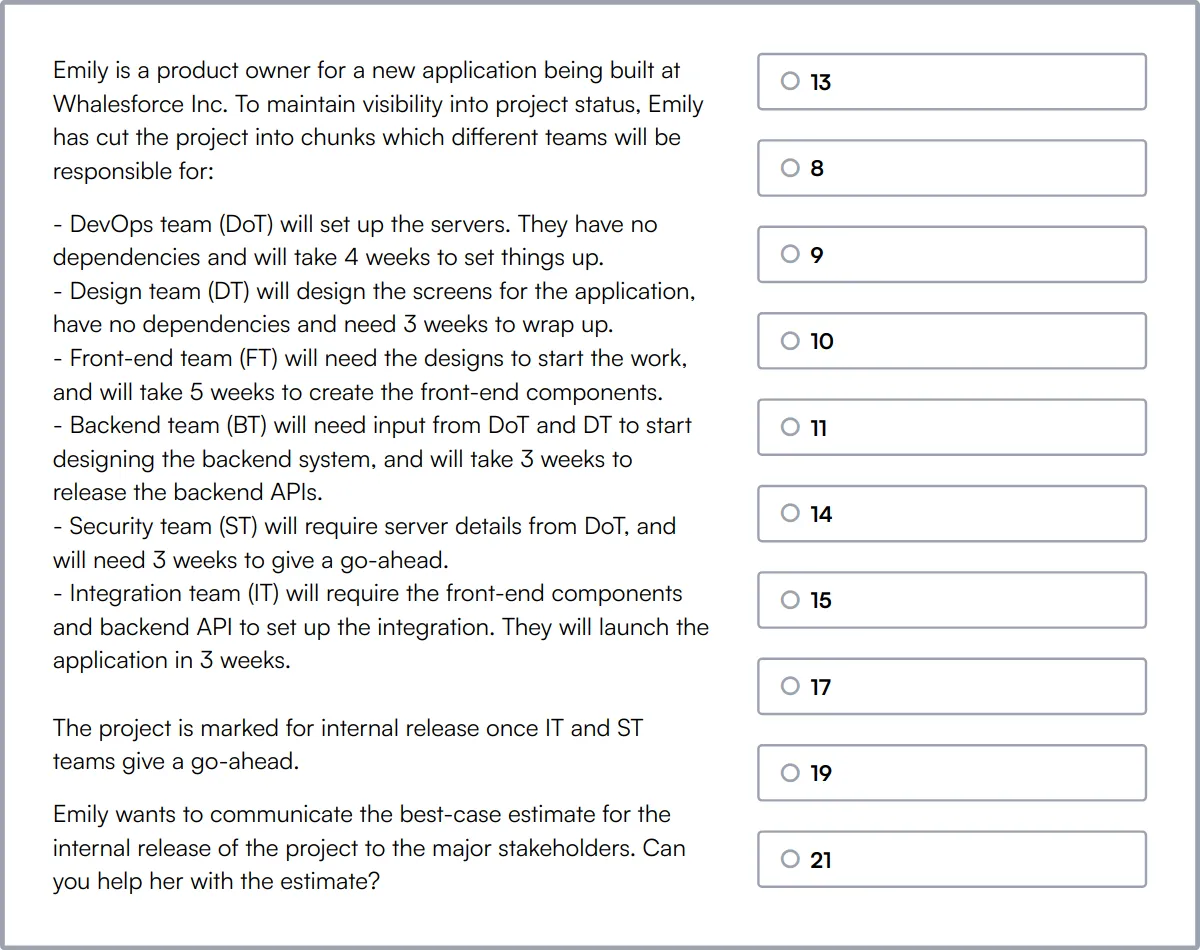
QA Engineer Test
The QA Engineer Test uses scenario-based MCQs to evaluate candidates on their understanding of various testing methodologies, test planning and execution, bug tracking, and test automation frameworks.
The test covers skills such as Quality Assurance (QA), Testing Fundamentals, Test Design Techniques, and Software Life Cycle. Candidates are also assessed on their knowledge of Selenium and Linux fundamentals.
Candidates who perform well demonstrate strong abilities in Program Testing and Risk Assessment, showcasing their expertise in ensuring software quality and reliability.
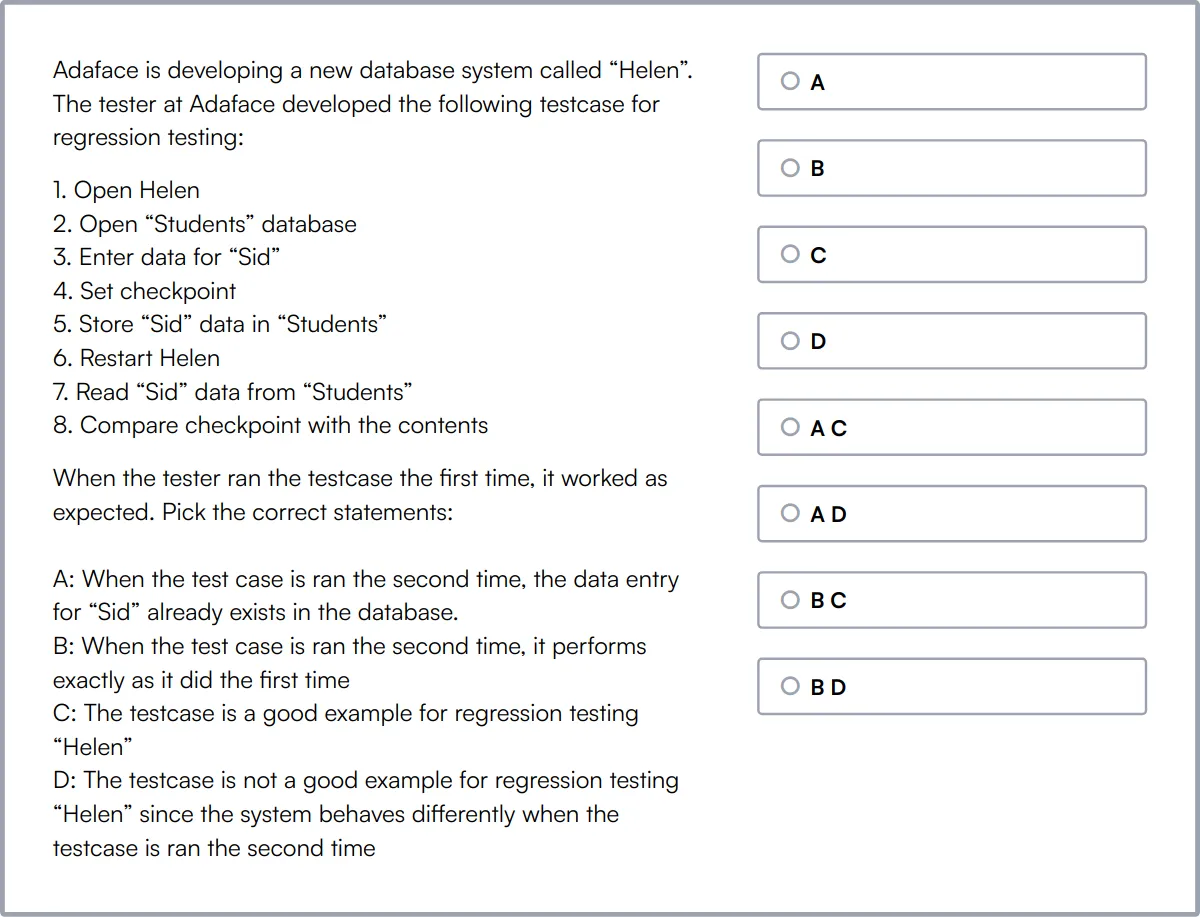
Summary: The 8 key Engineering Manager skills and how to test for them
| Engineering Manager skill | How to assess them |
|---|---|
| 1. Technical Expertise | Evaluate depth of technical knowledge in relevant engineering domains. |
| 2. Project Management | Assess ability to plan, execute, and deliver projects on time. |
| 3. Problem Solving | Observe approach to resolving complex, unexpected technical issues. |
| 4. Communication Skills | Review clarity, effectiveness, and adaptability of verbal and written communication. |
| 5. Risk Management | Check competence in identifying, analyzing, and mitigating risks. |
| 6. Resource Allocation | Determine efficiency in utilizing and optimizing available resources. |
| 7. Quality Assurance | Gauge commitment to standards through testing and process reviews. |
| 8. Strategic Planning | Evaluate skill in setting long-term goals and defining strategic actions. |
Prompts Engineering Online Test
Engineering Manager skills FAQs
How can recruiters assess technical expertise in an engineering manager?
Recruiters can evaluate technical expertise by reviewing the candidate's past projects, technical certifications, and conducting technical interviews. Asking about specific technologies and problem-solving scenarios can also provide insights.
What are effective ways to assess project management skills?
Assess project management skills by discussing past projects, asking about methodologies used, and how they handled timelines and budgets. Look for experience with tools like Jira or Trello.
How do you evaluate an engineering manager's communication skills?
Evaluate communication skills through behavioral interviews, focusing on how they convey complex ideas, handle feedback, and facilitate team meetings. Role-playing scenarios can also be useful.
What strategies can be used to assess risk management capabilities?
Ask candidates about past experiences where they identified and mitigated risks. Inquire about their approach to risk assessment and the tools they use to track and manage risks.
How can you determine a candidate's ability in resource allocation?
Discuss scenarios where they had to allocate resources under constraints. Ask about their decision-making process and how they prioritize tasks and team members.
What questions can reveal an engineering manager's mentoring skills?
Inquire about their experience in developing team members, how they provide feedback, and examples of mentees' growth. Ask about their approach to career development.
How do you assess adaptability in an engineering manager?
Explore past experiences where they had to adapt to changes in technology, team dynamics, or project scope. Ask how they handle unexpected challenges and learn new skills.
What indicators show strong stakeholder management skills?
Look for examples of successful stakeholder engagement, how they manage expectations, and their approach to communication. Ask about challenging stakeholder interactions and resolutions.

40 min skill tests.
No trick questions.
Accurate shortlisting.
We make it easy for you to find the best candidates in your pipeline with a 40 min skills test.
Try for freeRelated posts
Free resources



